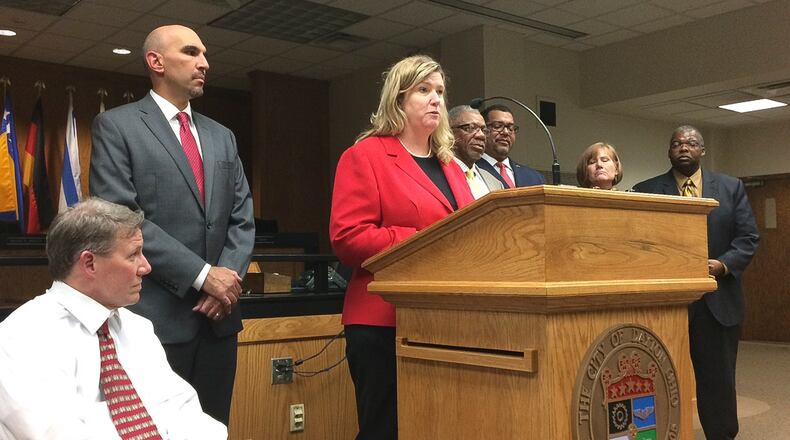The measure, however, doesn’t specify exactly how Dayton plans to amend its pot laws, and questions linger whether the steps the city takes truly will lead to fewer pot busts and will change policing strategies.
Dayton Mayor Nan Whaley says the people of Dayton want marijuana decriminalized and said she hopes and expects to see fewer people charged with minor marijuana violations moving forward.
“I don’t want people engaging in the criminal justice system because of marijuana,” she said. “I think this allows police to focus on the more important issues affecting our community.”
The election was lopsided: About 28,310 people voted yes for decriminalization, and about 10,222 voted said no, according to the unofficial election results from the Montgomery County Board of Elections.
Tuesday’s vote showed that the vast majority of the community does not see the criminalization of small amounts of marijuana as a criminal justice priority and the laws should be changed accordingly, said Angelina Jackson, assistant public defender with the Montgomery County Public Defender’s Office.
However, until the city changes its code, it’s impossible to say whether this will stop people from getting caught in the system, Jackson said.
If the fine is eliminated, a lot fewer people will be sent to collections for unpaid fines and costs, and they won’t be blocked by the courts from getting a driver’s license, Jackson said.
City leaders have not identified exactly what changes they will make to city code, but proposals include removing a $150 fine for misdemeanor pot offenses.
Under Dayton’s code, possession of less than 100 grams of marijuana is a minor misdemeanor violation.
Other proposed changes include classifying drug paraphernalia used solely for marijuana and hashish as a minor misdemeanor, as well as applying the same classification to gifting 20 grams or less of marijuana.
Whaley and other decriminalization supporters say marijuana laws are outdated and need reformed because public opinions about the drug have shifted dramatically in recent decades in favor of legalization.
Whaley said if marijuana legalization were an option, she would have asked Dayton voters if they wanted that.
Instead, Issue 8 asked Dayton voters if they want the city to amend its code to decriminalize certain misdemeanor marijuana and hashish offenses.
City leaders had said the advisory election would take the temperature of the community. City commissioners had vowed to move forward with amending the city’s pot ordinances, if most voters approved.
High-level conversations will now take place between the city’s prosecutor’s office, the law department, the police department, the city manager’s, commission’s and mayor’s offices, said Martin Gehres, assistant city of Dayton attorney.
Staff will present various options to revise city code, and city commission ultimately will consider legislation prepared by staff, Gehres said.
If the city eliminated the fine for pot possession, police officers would have little reason to issue a citation, Gehres said.
But Gehres stressed that no decisions have been made about how the city will proceed with decriminalization efforts.
The city can’t legalize pot, but it looking at what changes it can make to its code to be in line with the will of the community, he said.
About the Author

